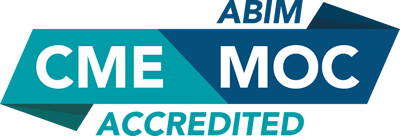
COURSE CREDITS & HOURS
14 AMA PRA Category 1 Credits™14 ACPE Credits
14.0 Contact Hours
14 (part II) MOC points in medical knowledge in the American Board of Internal Medicine's (ABIM) Maintenance of Certification (MOC) program
3 Hours of Pharmacology for Nurse Practitioners
COURSE FEES
TARGET AUDIENCE
PROGRAM PURPOSE
- Update on LDL-C Management for Cardiovascular Disease Prevention: New toos and new targets in the new era
- Review the approach to ASCVD risk assessment, which is key to matching the intensity of LDL-C lowering therapy with the absolute risk of the patient
- Dscuss the recommended patient groups for statin therapy
- Review the mechanism of action for the newer FDA-approved non-statin lipid lowering agents
- Discuss the new 2022 American College of Cardiology (ACC) Expert Decision Pathway, which provides guidance on statin alternatives in patients with ASCVD, including those with Familial Hypercholesterolemia (FH)
- Female specific risk factors that enhance womens cardiovascular risk throughout the lifespan
- Discuss unique cardiovascular risk factors that affect female patients and how to apply them to cardiovascular risk assessment to implement prevention and treatment strategies
- Microvascular angina, coronary microvascular dysfunction and INOCA (ischemia with non-obstructive coronary arteries) from diagnosis to treatment
- Discuss how to diagnosis coronary microvascular dysfunction (microvascular angina) and discuss prevention and treatment strategies
- Review the recommended approach to chest pain in women, and INOCA specifically, as outlined in the 2022 American Heart Association Chest Pain guidelines
- Chronic Kidney Disease and cardiovascular risk: protecting the heart and the kidney
- Evaluate for and monitor CKD in patients with T2D and cardiac disease
- Discuss the 2022 Kidney Disease Improving Global Outcomes (KDIGO) guideline for management of T2D in patients with CKD, with a focus on how to incorporate SGLT2 inhibitors and non-steroidal MRAs into management plans for patients with CKD, T2D, and CVD
- Aspirin and other antiplatelet therapy for cardiovascular disease prevention: a tight rope between preventing vascular events and avoiding bleeding.
- Review the mechanism of action of antiplatelet therapy
- Describe indications for antiplatelet therapy
- Explain risks and benefits of holding or de-escalating therapy
- Discuss how to assess a patient for the balance between managing ischemic risk and reducing risk for bleeding
- Obesity Management for Reducing Cardiovascular Risk
- Review the cardiovascular risks associated with obesity
- Summarize the benefits and challenges associated with lifestyle, bariatric, and historical pharmacologic interventions in the treatment of obesity, before focusing on the available evidence for the newer glucagon-like peptide-1 receptor agonist (GLP-1 RA) medications in the management of obesity and potential implications for reducing CVD risk
- Moving (and eating) your way to a healthier heart: Nutrition and physical activity recommendations for cardiovascular disease prevention
- Review dietary patterns with the most evidence for CVD prevention such as the Mediterranean style diet, DASH diet, and healthy plant-based diet
- Discuss emerging diets such as keto and intermittent fasting, which still require more long-term outcome data
- Review recommendations for physical activity and reduction of sitting time for CVD prevention in the general population, as well as special considerations for exercise and sports in patients with established cardiovascular disease
- CAC Score to Guide CV Risk Assessment When Decision for Statin and Other Preventive Therapies is Uncertain
- Identify which patients may be candidates for CAC assessment to refine CV risk
- Use the CAC score to guide treatment management, for both statin and non-statin preventive therapies
- Recent Updates in Hypertriglyceridemia Management for Cardiovascular Disease Prevention
- Discuss lifestyle approaches to managing hypertriglyceridemia >li>Discuss elevated triglycerides as a risk enhancing factor that would favor initiation of statin treatment
- Discuss the trials investigating fibrate therapy and omega-3 fatty acid therapy for ASCVD prevention in persons with hyperglyceridemia
- Discuss current cardiology consensus recommendations for management of ASCVD risk reduction in patients with persistent hypertriglyceridemia, which endorse the use of IPE in statin-treated patients at high cardiovascular risk who have triglycerides >135 mg/dL
- The Mind-Heart-Body connection: psychological factors and their influence of cardiovascular health
- Review the evidence supporting psychological health and CVD
- Consider psychological health in the evaluation and management of patients with or at risk for CVD
























